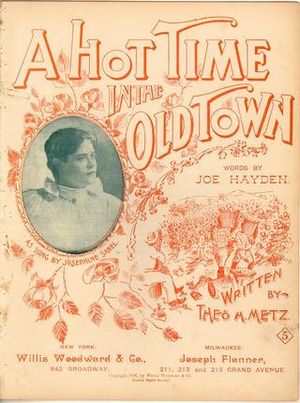There'll Be a Hot Time in the Old Town Tonight facts for kids
Quick facts for kids "A Hot Time In The Old Town" |
|
|---|---|

Sheet music cover (1896).
|
|
| Song | |
| Published | 1896 |
| Genre | Popular song |
| Songwriter(s) | Composer: Theodore A. Metz Lyricist: Joe Hayden |
"A Hot Time in the Old Town" is a famous American song. It is also known as "There'll Be a Hot Time in the Old Town Tonight". The song was officially registered in 1896. It was likely written by Theodore August Metz, who composed the music, and Joe Hayden, who wrote the words. Theodore Metz was the leader of a band called the McIntyre and Heath Minstrels.
How the Song Began
There are a few stories about how "A Hot Time in the Old Town" was created.
The Train Ride Story
One story says that Theodore Metz was traveling with his band, the McIntyre and Heath Minstrels. Their train stopped in a place called "Old Town." From the train window, Metz saw some children starting a small fire near the tracks. Another person in the band joked, "There'll be a hot time in the old town tonight!" Metz quickly wrote down this phrase. He planned to use it for a march song. The very next day, he wrote the music for the march. His band then used it in their street parades.
The Hot Springs Story
Another story suggests that Metz and his band were in Hot Springs, South Dakota. There, they met Joe Hayden, who worked at the Evans Hotel. Hayden knew parts of the song from his childhood in New Orleans. He and Metz worked together to write the first full version of "Hot Time." They created it for a special event at the local Chautauqua Park and Entertainment Center. This story is shared in a book from 2015 called And The Wind Whispered.
Was the Phrase Older?
It seems that the phrase "a hot time in the old town" might have been around even before Metz and Hayden wrote the song.
- In 1891, a newspaper in Salina, Kansas, mentioned the phrase. It described a hotel fire in Chicago. The article said that the last notes played on an organ during the fire were "There'll Be a Hot Time in the Old Town, To-night." The newspaper seemed to expect readers to already know this tune or phrase.
- In 1890, a newspaper in Centralia, Wisconsin, wrote about a football game. It put the phrase "there will be a hot time in the old town tomorrow tonight" in quotation marks. This also suggests that the phrase was already a well-known part of American culture.
 | Shirley Ann Jackson |
 | Garett Morgan |
 | J. Ernest Wilkins Jr. |
 | Elijah McCoy |

